The problem with growing startups or small businesses is scalability when they reach a path where they are neither small nor big, too big to use public cloud storage services and too small to afford enterprise storage solutions such as Amazon Web Services. Public cloud storage services start out cheap but could become prohibitively expensive as more data is stored.
Continue ➤ 9 Free Self Hosted Cloud Storage Software For Home Office
Depending on factors outside your control, performance can be unreliable, at the same time there is a high privacy and security risk involved with storing certain data on someone else’s ‘cloud’ computer unless you pay a premium for enterprise military grade encryption.
This is where Prosumer comes into play, it hits the sweet spot between Consumer and Professional. Storage Operating System allows you to set up your own ‘Cloud’ on your network at your own cost. Because these OS uses a desktop computer as a storage system, it doesn’t make any sense for Home Users to run it for 24/7, if you’re into creating a central network storage system for your house, get a consumer NAS Storage from WD Red, D-Link, Asus or Seagate IronWolf. Without further ado, here are some free and open-source network-attached storage (NAS) OS software for small businesses.
- Western Digital Network Attached Storage NAS [ My Cloud Series for Small Business ]
- Seagate NAS OS for Exos and Nytro SSD HDD System for Enterprise
- Synology NAS [ For Personal, Small Business and Enterprise ]
1. FreeNAS
What is FreeNAS? FreeNAS is an operating system that can be installed on virtually any hardware platform to share data over a network. FreeNAS is the simplest way to create a centralized and easily accessible place for your data. Use FreeNAS with ZFS to protect, store, backup, all of your data. FreeNAS is used everywhere, for the home, small business, and the enterprise.
What is ZFS? ZFS is an enterprise-ready open source file system, RAID controller, and volume manager with unprecedented flexibility and an uncompromising commitment to data integrity. It eliminates most, if not all of the shortcomings found in legacy file systems and hardware RAID devices. Once you go to ZFS, you will never want to go back.
- Encryption – FreeNAS is the first and only open source project to offer encryption on ZFS volumes! A full-volume encryption option is available during volume creation, providing industry standard AES-XTS encryption which can be hardware-accelerated (when the processor has AES-NI capability).
- Replication – ZFS Snapshots are more than just local backups – they can be used to create remote backups as well. Replicating snapshots of the filesystem to a remote ZFS filesystem creates a complete duplicate there.
- Snapshots – Thanks to ZFS, snapshots of the entire filesystem can be made and saved at any time. As long as a snapshot exists, administrators can access files as they were when the snapshot was made.
- Data Protection – ZFS is designed for data integrity from top to bottom. RAID-Z, the software RAID that is part of ZFS, offers single parity protection like RAID 5, but without the “write hole” vulnerability thanks to the copy-on-write architecture of ZFS.
- File Sharing – File sharing is what FreeNAS does best. Every major operating system is supported with SMB/CIFS (Windows file shares), NFS (Unix file shares) and AFP (Apple File Shares) as well as FTP, iSCSI (block sharing), WebDAV and other methods of sharing data over the network are available.
2. XigmaNAS / NAS4Free
XigmaNAS / NAS4Free is an Open Source Storage NAS (Network-Attached Storage) distribution based on FreeBSD. The NAS4Free operating system can be installed on virtually any hardware platform to share computer data storage over a computer network. ‘NAS’ as in “Network-Attached Storage” and ‘4Free’ as in ‘Free and open source’, NAS4Free is the simplest and fastest way to create a centralized and easily-accessible server for all kinds of data easily accessed with all kinds of network protocols and from any network.
NAS4Free supports sharing across Windows, Apple, and UNIX-like systems. It includes ZFS v5000 , Software RAID (0,1,5), disk encryption, S.M.A.R.T / email reports etc. with the following protocols: CIFS/SMB (Samba), Active Directory Domain Controller (Samba), FTP, NFS, TFTP, AFP, RSYNC, Unison, iSCSI (initiator and target), HAST, CARP, Bridge, UPnP, and Bittorrent which is all highly configurable by its WEB interface. NAS4Free can be installed on Compact Flash/USB/SSD key, Hard disk or booted from a LiveCD/LiveUSB with a small usb key for config storage.
- BitTorrent client (Transmission)
- iTunes/DAAP server (Firefly)
- Network Bandwidth measure tool (iPerf3)
- RRDtool
- UPnP server (fuppes)
- UPnp server (MiniDLNA)
- Web Server (lighttpd)
3. OpenMediaVault
openmediavault is the next generation network attached storage (NAS) solution based on Debian Linux. It contains services like SSH, (S)FTP, SMB/CIFS, DAAP media server, RSync, BitTorrent client and many more. Thanks to the modular design of the framework it can be enhanced via plugins.
openmediavault is primarily designed to be used in small offices or home offices, but is not limited to those scenarios. It is a simple and easy to use out-of-the-box solution that will allow everyone to install and administer a Network Attached Storage without deeper knowledge.
- Debian Linux OS with Web based administration
- Volume management and S.M.A.R.T.
- Link aggregation
- Wake On Lan
- IPv6 support
- Email notifications
- File sharing
4. Openfiler
Openfiler converts an industry standard x86_64 architecture system into a full-fledged NAS/SAN appliance or IP storage gateway and provides storage administrators with a powerful tool to cope with burgeoning storage needs. Openfiler ensures that storage administrators are able to make the best use of system performance and storage capacity resources when allocating and managing storage in a multi-platform network.
Openfiler provides key features such as iSCSI target for virtualization, Fibre Channel target support, block level replication and High Availability that are the mainstay of any business critical storage environment. Openfiler addresses all the key data storage concerns:
- Reliability – Openfiler supports both software and hardware RAID with monitoring and alert facilities; volume snapshot and recovery
- Availability – Openfiler supports active/passive high availability clustering, MPIO, and block level replication
- Performance – Linux 2.6 kernel supports the latest CPU, networking and storage hardware
- Scalability – file system scalability to 60TB+, online filesystem and volume growth support
5. Rockstor
Build and manage your own Linux & BTRFS powered advanced NAS and Cloud storage with ease. Rockstor Small and Midsize Business (SMB) Cloud Server is the recommended solution for organizations with several hundred Terabytes of capacity requirement. Your organization may rely on expensive public cloud storage and also store a lot of data locally causing you to switch between local and cloud and ultimately resulting in inefficiency and loss of productivity.
- Build your Private Cloud Storage and empower your organization with a hybrid workflow leveraging the best of both public and private cloud storage
- Seamlessly integrate with public cloud storage resulting in efficiency and lower operating cost
- Scale your storage needs with low incremental cost
- Manage your storage with little to no IT experience
6. PetaSAN
PetaSAN is an open source Scale-Out SAN solution offering massive scalability and performance. PetaSAN uses modern cloud based technologies to provide the elasticity and agility to scale up the storage cluster simply by adding more nodes, this can be done at any time and in a truly non-disruptive manner.
PetaSAN is designed from the ground up to do one thing: provide highly available clustered iSCSI disks. In PetaSAN, an iSCSI disk can have many access paths, each identified by its virtual IP address. These IP addresses are clustered across several storage nodes.
7. ESOS – Enterprise Storage OS
Enterprise Storage OS is a quasi Linux distribution based on the excellent SCST project; its purpose is to provide SCSI targets via a compatible SAN (Fibre Channel, InfiniBand, iSCSI, FCoE). In a nutshell, ESOS® can easily turn a server with the appropriate hardware into a disk array that sits on your enterprise Storage Area Network (SAN) providing sharable block-level storage volumes.
Typical uses for an ESOS® “storage server” include VMFS datastores on VMware ESX/ESXi, Windows NTFS volumes, Linux disks, etc. A high performance, purpose-built (appliance like) Linux base built from scratch, with no relation to other Linux distributions.
- ESOS is memory resident — it boots off a USB flash drive, and everything is loaded into RAM. If the USB flash drive fails, ESOS® will send an alert email, and you can simply build a new ESOS® USB flash drive, then replace the failed drive and sync the configuration.
- Kernel crash dump capture support. If the ESOS® Linux kernel happens to panic, the system will reboot into a crash dump kernel, capture the /proc/vmcore file to the esos_logs file system, and finally reboot back into the production ESOS® kernel — all automatically. ESOS® sends an email alert on system start-up and checks for any crash dumps.
- Two operating modes: Production (default) & Debug. With “Production” mode, the performance version of SCST (make 2perf) is used. If you find you’re having a problem and not getting sufficient diagnostic logs, simply reboot into “Debug” mode (full SCST debug build, make 2debug) and get additional log data.
- Enterprise RAID controller CLI configuration tools. Popular RAID controller CLI tools are an optional install with ESOS® (eg, LSI MegaRAID, Adaptec AACRAID, etc.) which allows configuration (add/delete/modify) of volumes / logical drives from a running ESOS® system.
- ESOS® is compatible with most popular enterprise RAID controllers and Tier-1 server hardware. It currently supports the following front-end target types: Fibre Channel, iSCSI, InfiniBand (SRP), Fibre Channel over Ethernet (FCoE)
- A text-based user interface (TUI) that provides an easy to use interface with convenient storage provisioning functions; see how it looks on the 02_Screenshots wiki page.
- Clustering / high availability (HA) components: Pacemaker + Corosync + DRBD
- Create advanced back-end storage block device configurations using Linux software RAID (md) and Logical Volume Manager (LVM2).
- Create virtual tape libraries (disk based) that can be used on your Storage Area Network (SAN). Works with popular software solutions such as Symantec NetBackup, Symantec BackupExec, EMC/Legato NetWorker, Bakbone Netvault, Tivoli Storage Manager (TSM), and Bacula. Support for VTLs in ESOS® is made possible via the mhVTL project.
- Inline data de-duplication using lessfs; includes support for encryption and compression using QuickLZ, Google’s Snappy, or LZO.
- Support for Linux Ethernet bridging and NIC bonding (EtherChannel).
- Software-based block layer cache solutions: bcache, dm-cache/lvmcache, and EnhanceIO.
- Tiered storage devices with automatic migration and “smart” placement of data chunks via the BTIER project.
- Support for using Ceph RBD images as back-end storage devices.
- Advanced Fibre Channel over Ethernet (FCoE) support: ESOS® includes the fcst “software” FCoE target driver, and has the ability (build options) to support Emulex OCS FCoE CNA / Chelsio Uwire FCoE CNA hardware targets.
- The advanced ZFS storage subsystem is supported as a build option (via the ZFS on Linux project).
8. CryptoNAS
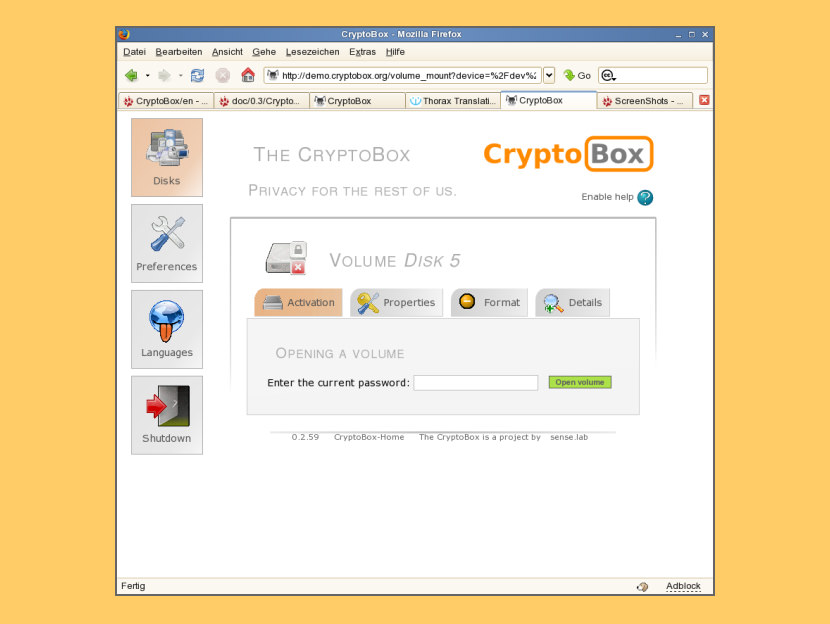
The CryptoNAS project brings data encryption to the masses. The CryptoNAS live-CD is made for people who want to encrypt their data without bothering about complicated technical issues. A computer running the CryptoNAS live-CD works as a fileserver (NAS) that encrypts your private data. The CryptoNAS-Server package adds a user-friendly, web-based frontend for harddisk encryption to an existing file server.


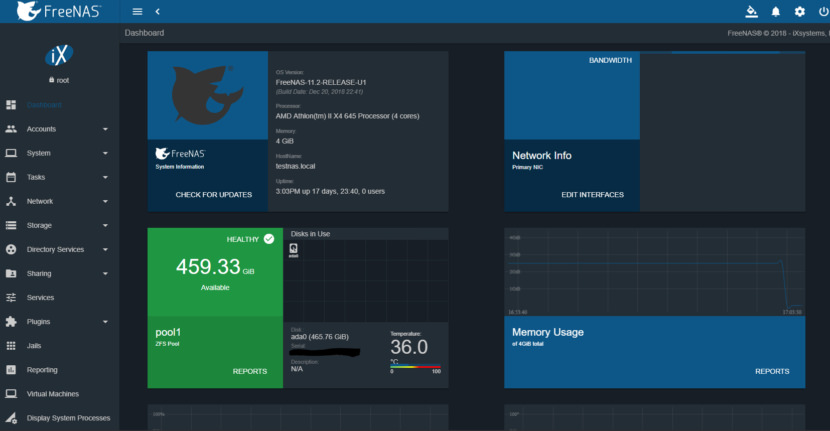
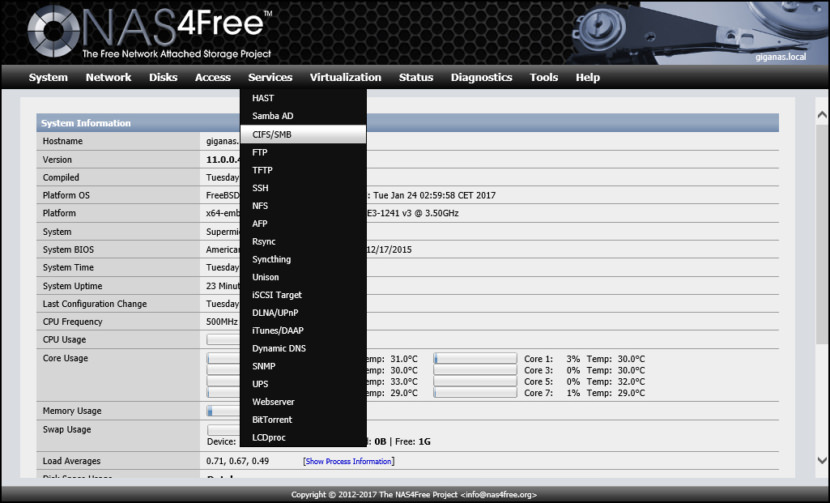
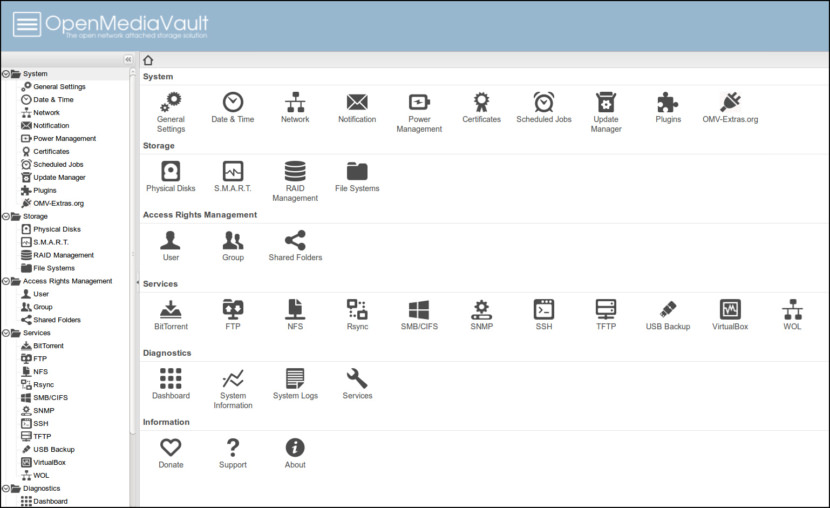
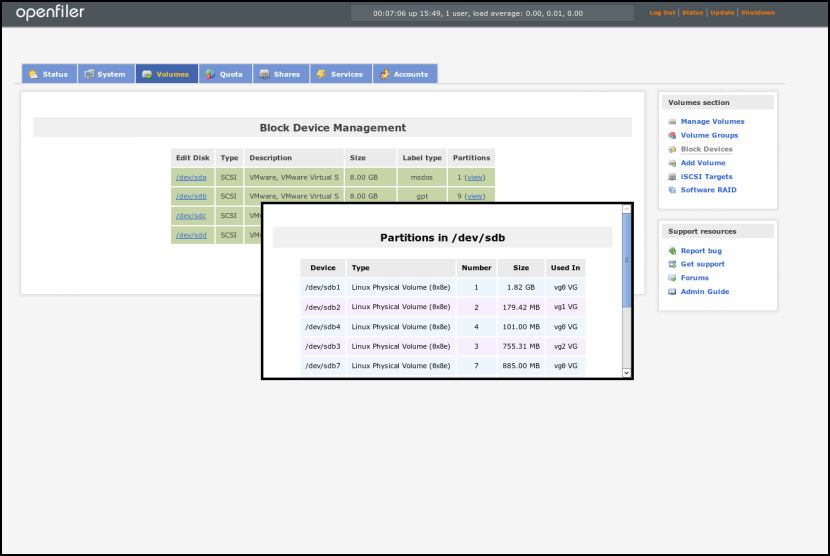
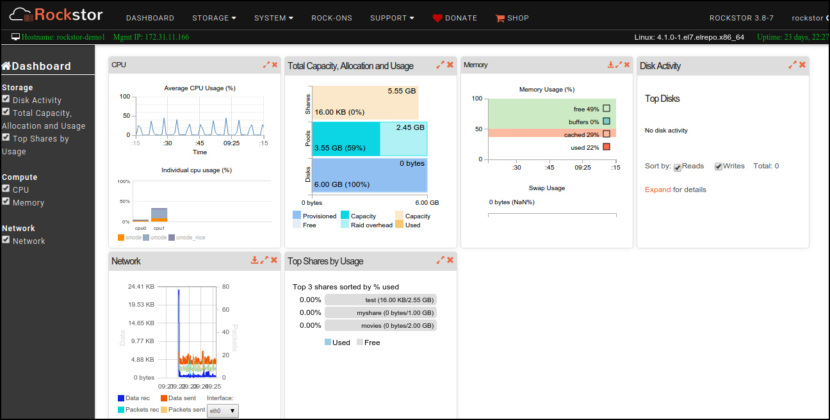
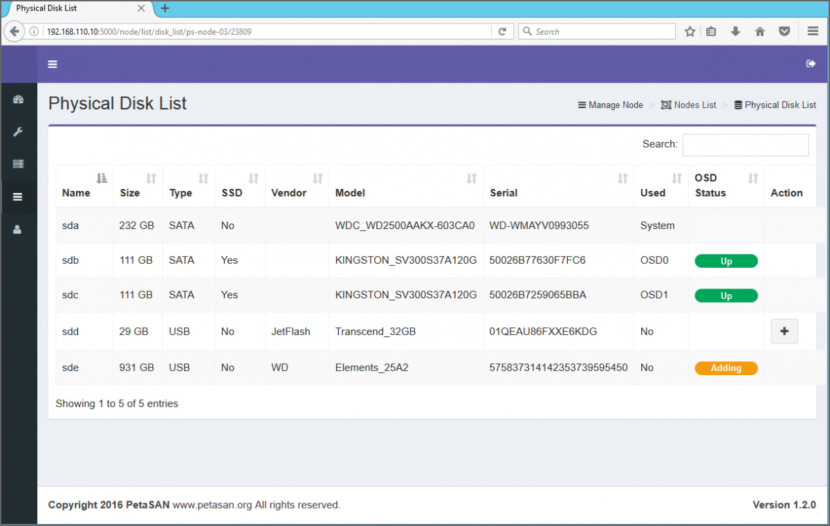
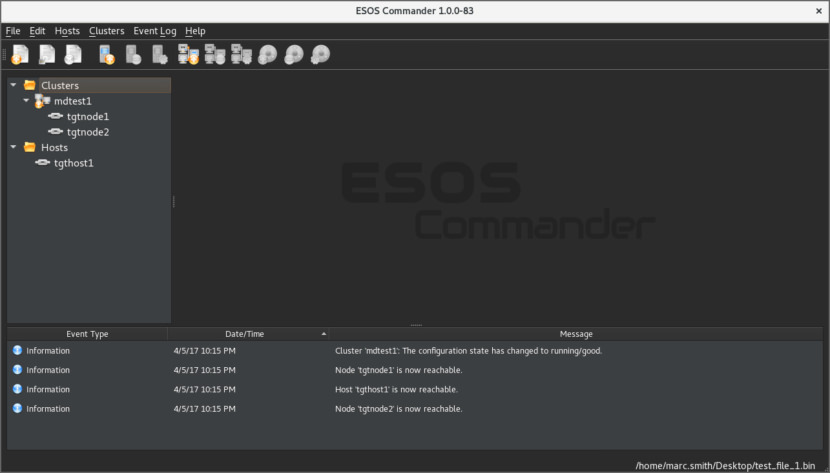


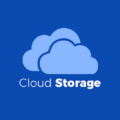

Free NAS is good, but NOT User friendly. It’s very difficult to set up.
And what about Unraid ?